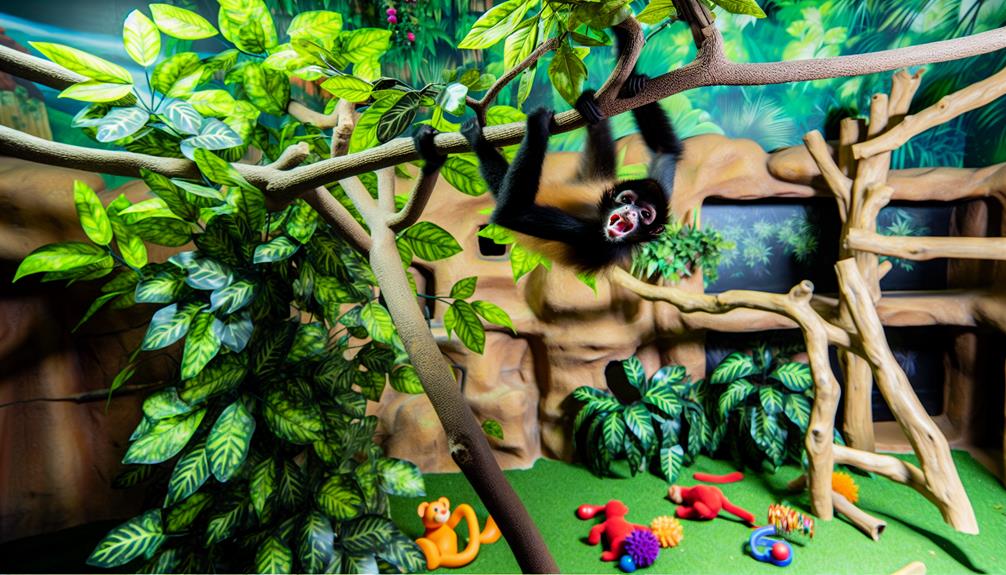Owning a spider monkey as a pet demands careful consideration of various factors. Legal regulations regarding exotic pet ownership vary widely and may require permits. These primates thrive on social interaction, necessitating regular bonding with humans and other animals to prevent behavioral issues. Their dietary needs include a balanced intake of fresh fruits, vegetables, and protein sources. A spacious environment replicating their natural habitat is vital, along with regular veterinary care. Understanding their complex social structures and ethical implications of domestication is important for responsible ownership. Continue exploring to uncover additional essential insights into monkey care and management.
Key Takeaways
- Legal ownership of spider monkeys varies by location, often requiring permits and compliance with local regulations.
- They have strong social needs and require regular interaction with both humans and other animals to thrive.
- A balanced diet of fresh fruits, vegetables, and protein sources is essential for their health and longevity.
- Adequate space and environmental enrichment, including climbing structures and interactive toys, are crucial for their well-being.
- Ethical considerations are paramount, as captivity may compromise their social structures and disrupt ecosystems.
Legal Considerations

When evaluating a spider monkey as a pet, it is vital to be aware of the legal considerations surrounding their ownership, as regulations can vary considerably by location. Many jurisdictions impose legal restrictions on the ownership of exotic pets, including spider monkeys, often requiring specific ownership permits to guarantee compliance with wildlife regulations. Additionally, it is significant to reflect on the ethical implications of ownership, as highlighted by recent discussions in the gaming world about the responsibilities of characters in situations like the ethical dilemmas faced in games.
Potential owners must familiarize themselves with local zoning laws, as some areas prohibit exotic pet ownership entirely, while others may allow it under certain conditions. Moreover, breeding laws may come into play, as breeding spider monkeys can require further permits and adherence to animal welfare standards to prevent inhumane practices.
Additionally, import regulations can complicate the acquisition of spider monkeys, particularly in regions with stringent laws aimed at protecting native wildlife and preventing illegal trafficking. Engaging with responsible breeders or sanctuaries can provide guidance on maneuvering through these legal frameworks. Ultimately, understanding these legal considerations is indispensable for any prospective owner to confirm that they are abiding by the law while promoting the well-being of the animal.
Social Needs
Spider monkeys possess complex social needs that are crucial for their well-being. They thrive on social interactions and require a stimulating environment to develop their natural behaviors. Companionship with humans and interaction with other animals are critical for their socialization, as these interactions can greatly influence their behavior and emotional health. Understanding and addressing these social requirements is essential for anyone considering a spider monkey as a pet. Additionally, enhancing your social skills can be beneficial in forging strong bonds with your pet, creating a more enriching experience for both of you. magnetic social skills
Importance of Companionship
The social nature of spider monkeys underscores the significance of companionship in their lives, making them ill-suited for solitary living. These primates thrive in social groups, where they develop complex relationships and engage in a variety of bonding techniques. The emotional benefits of companionship are profound, as they promote mental well-being and reduce stress for both the spider monkey and its human counterparts.
To highlight the importance of companionship, consider the following table that outlines key aspects:
| Aspect | Description |
|---|---|
| Social Structure | Live in troops of 20-30 members |
| Bonding Behaviors | Grooming, playing, and vocalizing |
| Emotional Impact | Reduces anxiety and fosters joy |
Without adequate social interaction, spider monkeys may exhibit behavioral issues, including aggression and depression. Consequently, potential owners must recognize their responsibility in providing a stimulating environment that facilitates social interaction. Ensuring companionship is not merely an option but a necessity for the well-being of your spider monkey, promoting a healthier and happier life.
Socialization With Humans
Establishing a strong social bond with humans is essential for the well-being of spider monkeys, as they require regular interaction to thrive outside their natural habitat. These primates, known for their intelligence and social nature, can develop deep connections with their human caregivers. Adequate human interaction serves not only to fulfill their emotional needs but also to prevent behavioral issues that may arise from isolation.
To effectively socialize spider monkeys, consider the following bonding techniques:
- Routine Engagement: Schedule daily interactions that include playtime, grooming, and feeding. Consistency helps them feel secure and valued.
- Positive Reinforcement: Utilize treats and praise to encourage desired behaviors during interactions. This builds trust and reinforces social bonds.
- Enriched Environment: Provide stimulating environments that mimic their natural habitat, including climbing structures and toys. This encourages exploration and promotes positive interactions with humans.
Interaction With Other Animals
Social bonds in spider monkeys extend beyond their interactions with humans; they also play a significant role in their relationships with other animals. These primates are inherently social creatures, thriving in dynamic groups that facilitate complex social structures. Their playful interactions with conspecifics foster essential bonding and communication skills, enabling them to navigate their social environment effectively.
However, spider monkeys exhibit strong territorial behavior, particularly when competing for resources such as food and shelter. This territoriality can lead to conflicts with other species, as well as within their groups. Understanding these dynamics is vital for potential pet owners, as it underscores the importance of providing an appropriate social environment for a spider monkey.
When kept as pets, spider monkeys require ample space and opportunities for social interaction, not only with humans but also with other animals. Fostering a stimulating environment that accommodates these needs can help mitigate territorial aggression and enhance their overall well-being. Consequently, prospective owners must prioritize creating a social landscape that supports the natural behaviors of spider monkeys, ensuring they remain healthy and engaged members of their social group.
Dietary Requirements

Guaranteeing a balanced diet is crucial for the health and well-being of spider monkeys kept as pets. These primates have specific nutritional needs that must be met to promote their longevity and energy. A well-structured diet should focus on achieving nutritional balance while considering their food preferences, which primarily lean towards fruits, vegetables, and some protein sources. Understanding the importance of tailored nutrition can also enhance their overall cognitive function and adaptability, similar to the benefits seen in adaptive learning technology.
To effectively provide for their dietary requirements, consider the following key components:
- Fruits and Vegetables: Fresh, organic fruits and vegetables should make up the majority of their diet. Choices like bananas, apples, leafy greens, and carrots are generally favored and provide essential vitamins and minerals.
- Protein Sources: Incorporate moderate amounts of protein, such as boiled eggs, legumes, or specially formulated primate pellets, to guarantee adequate amino acid intake.
- Calcium and Supplements: It may be necessary to provide calcium supplements or mineral-rich foods to prevent deficiencies, especially if their diet lacks certain nutrients.
Space and Environment
Spider monkeys require a spacious and enriched environment to thrive as pets, reflecting their natural habitats in the wild. These primates are highly social animals that need ample room for climbing and swinging, as well as opportunities for mental stimulation through enrichment activities. Incorporating elements that mimic their natural surroundings, such as climbing structures and foraging opportunities, is vital for their happiness. Understanding their habitat requirements is essential for promoting their well-being and ensuring a harmonious coexistence in a domestic setting. puzzle-solving strategies
Habitat Requirements
Creating an appropriate habitat for a spider monkey requires a significant commitment to space and environmental enrichment. These primates are naturally found in tropical rainforests, where they thrive in warm and humid climates. To replicate their natural environment, their habitat must be spacious and stimulating, allowing them to exhibit their natural behaviors.
Here are three key habitat requirements:
- Adequate Space: Spider monkeys need a minimum of 200 square feet of outdoor space, with vertical climbing structures to mimic their arboreal lifestyle. The more space available, the better their physical and mental well-being.
- Climate Preferences: Maintaining a climate that mimics their native environment is essential. Temperatures should remain between 75°F and 85°F with adequate humidity levels to guarantee comfort and health.
- Habitat Enrichment: Providing a variety of natural materials, such as branches, ropes, and foliage, encourages exploration and play. Incorporating interactive elements can stimulate their cognitive abilities and prevent boredom.
Enrichment Activities Needed
Enrichment activities are crucial for the physical and psychological well-being of spider monkeys, as they thrive on stimulation and interaction within their environment. Providing appropriate enrichment helps to mimic their natural habitat and encourages natural behaviors, which is essential for their happiness and health.
| Activity Type | Purpose | Examples |
|---|---|---|
| Foraging Toys | Stimulates natural foraging | Hidden treats, forage boxes |
| Climbing Structures | Encourages physical activity | Ropes, branches, platforms |
| Puzzle Feeders | Engages problem-solving skills | Interactive food dispensers |
| Social Play | Fosters social bonds | Group play, interactive training |
Incorporating sensory stimulation through varied textures, scents, and sounds can further enhance their environment. Enrichment games and interactive training sessions promote cognitive development and can strengthen the human-monkey bond. Additionally, guarantee proper escape prevention measures are in place to create a secure space for these intelligent creatures. By understanding and implementing these enrichment activities, owners can provide a fulfilling life for their spider monkeys, nurturing their innate behaviors and fostering a sense of belonging in their shared space.
Health Care Essentials

Guaranteeing the health and well-being of a spider monkey as a pet requires a thorough understanding of their specific care needs. These primates are complex creatures that demand attentive health care practices, which include regular veterinary check-ups, a strict vaccination schedule, and appropriate grooming. Additionally, being knowledgeable about their behavior and social needs is vital to providing a balanced environment for your pet; mastering your understanding of their unique requirements will help foster a happy and healthy life.
- Veterinary Care: Regular visits to a veterinarian specializing in exotic animals are essential. These check-ups should include vaccinations that protect against common diseases, as well as routine health assessments.
- Vaccination Schedule: Adhering to a vaccination schedule is critical for preventing diseases that could jeopardize your spider monkey's health. Consult with your veterinarian to develop a thorough plan tailored to your pet's specific needs.
- Grooming Needs: Spider monkeys require regular grooming to maintain their coat and skin health. This includes periodic bathing and nail trimming, which can help prevent health issues and guarantee their comfort.
Behavioral Challenges
Understanding the health care needs of spider monkeys lays the groundwork for addressing potential behavioral challenges that may arise in a domestic setting. These primates are highly intelligent and social animals, which can lead to issues such as aggression and inappropriate play behavior if not properly managed.
Aggression management is essential, as spider monkeys can exhibit territorial or dominance-related aggression, especially during adolescence. Establishing clear behavioral boundaries and consistent training methods is critical in mitigating aggressive tendencies. Engaging in positive reinforcement techniques can foster a trusting relationship and encourage desirable behaviors.
Additionally, understanding the natural play behavior of spider monkeys is important. They are active and require ample mental and physical stimulation to thrive. Providing a variety of toys, climbing structures, and social interaction opportunities can help channel their energy productively. Without adequate stimulation, these animals may resort to destructive behaviors or aggression as a form of expression.
Ethical Implications

The decision to keep a spider monkey as a pet raises significant ethical implications that warrant careful consideration. These primates are complex beings with intricate social structures and specific environmental needs that are often unmet in captivity. Consequently, the welfare concerns associated with keeping spider monkeys as pets are profound, leading to distress and behavioral issues.
Moreover, the practice of keeping spider monkeys as pets has broader conservation impacts. It can contribute to the illegal wildlife trade, further threatening their populations in the wild. The following points illustrate the ethical considerations involved:
- Welfare Concerns: Spider monkeys require extensive social interaction and mental stimulation, which are difficult to replicate in a home environment.
- Conservation Impact: Captive breeding for the pet trade can undermine conservation efforts aimed at preserving natural populations in their native habitats.
- Biodiversity and Ecosystem Health: Removing spider monkeys from their ecosystems can disrupt local biodiversity and ecological balance.
Frequently Asked Questions
What Is the Average Lifespan of a Pet Spider Monkey?
The average lifespan of a spider monkey in captivity typically ranges from 20 to 40 years, contingent upon adequate care. Meeting their dietary needs, which include a variety of fruits, leaves, and nuts, is crucial for their long-term health. Additionally, providing appropriate habitat requirements, such as ample space for climbing and social interaction, is fundamental for their well-being. Addressing these factors guarantees a fulfilling life for these intelligent and social primates.
Can Spider Monkeys Be Trained to Use a Litter Box?
Litter box training for spider monkeys presents several behavioral challenges, as these primates possess instinctual tendencies that may not align with such training. While some individuals may learn to use a litter box with consistent positive reinforcement and patience, success is not guaranteed. Factors such as age, temperament, and individual personality greatly influence the outcome. Consequently, potential owners must be prepared for the complexities involved in litter box training these intelligent and active animals.
Do Spider Monkeys Require a Companion, or Can They Live Alone?
Spider monkeys exhibit pronounced social behavior, thriving in groups within their natural habitats. These primates are innately social creatures and do not typically adapt well to solitary living. Isolation can lead to psychological distress and behavioral issues, underscoring the importance of companionship for their well-being. Consequently, for ideal mental health and enrichment, it is advisable to keep spider monkeys in pairs or groups, reflecting their natural tendencies and promoting a healthier lifestyle.
What Specific Toys Are Suitable for Spider Monkeys?
When considering appropriate toys for spider monkeys, it is essential to focus on enrichment activities that stimulate their natural behaviors. Suitable toys include climbing structures, ropes, and foraging puzzles that promote exploration and problem-solving. Additionally, materials should be non-toxic and durable, ensuring safe habitats for these intelligent creatures. Incorporating a variety of textures and movements in their toys enhances their physical and mental well-being, fostering a sense of belonging and engagement in their environment.
How Do Spider Monkeys Communicate With Humans?
Spider monkeys communicate with humans primarily through a combination of vocalizations and body language. Their vocalizations include a range of calls that convey emotions and intentions, while their behavior—such as gestures and postures—provides additional context to their interactions. Understanding these communication methods fosters a deeper connection, as recognizing and interpreting these signals can enhance the bond between humans and spider monkeys, promoting effective and enriching interactions.




